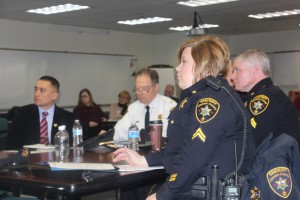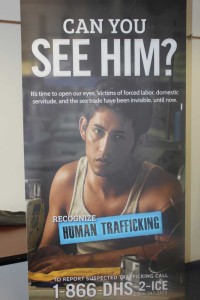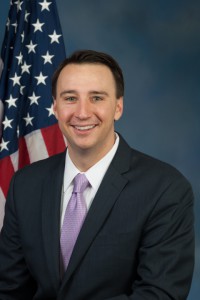Regional Law Enforcement & Homeland Security meet to combat ‘hidden’ crime
By Kim Chiomento, Staff Writer, The Times

Local law enforcement attendees receive intensive training on recognizing and responding to human trafficking.
MALVERN – U.S. Rep. Ryan Costello (R-6) brought together key experts from US Department of Homeland Security (DHS), regional law enforcement, and social services agencies. The meeting, held last week at Penn State’s Great Valley campus, is the latest in an effort to educate and combat human trafficking and shine a light on what has become both a national and international ‘hidden’ epidemic.
Costello said that while Chester County might seem like an unlikely place for human trafficking, the reality is that it is happening.
“The perception is we live in a bucolic county with great schools and are removed from this heinous crime,” he said. “But, the reality is human trafficking is happening everywhere, including here in our own backyards. It is very clear that this despicable problem is not going away.”
The Polaris Project (named after the North Star that guided slaves to freedom in the U.S.) is a major advocate for eradicating, exposing and disrupting the conditions that allow human trafficking to thrive in our society. Polaris reports that in 2014, Pennsylvania had 82 known cases and 426 calls of human trafficking violations.
“The goal today is to provide the most valuable training to local law enforcement who are first responders and could encounter a situation where human trafficking may be part of a crime,” William Walker, Assistant Special Agent in Charge for Homeland Security Investigations Philadelphia told The Times, “We are going to raise awareness to the psychological sides of trafficking, how perpetrators capitalize on addictions and are extremely savvy at exploiting vulnerabilities.”
Most human trafficking crimes involve an insidious exploitation of an existing relationship. The level of control perpetrators hold over their victims, combined with a victims’ fear of retribution, creates an extremely low rate of self-reporting. Another challenge facing law enforcement is that trafficking operations are easily concealed, conducted in settings where both the victim and perpetrator can easily blend into society and signs are not always easily identified by the casual observer. When found, victims have often become numb to their situation; and, they are no longer aware of the level of trauma and abuse that is occurring.
Human trafficking is divided into three subcategories: forced labor (‘sweat shops’), domestic servitude and sex trade. Trafficking generates $9.8 billion of economic activity in the United States alone, and is second only to drug trafficking as the most profitable form of transnational crime. Some experts place estimates as high as 20 million victims globally.
Domestically, approximately 80% of trafficking involves the sex trade, whereas globally about 70% of cases are labor trafficking. According to Polaris, approximately 300,000 young Americans are in danger of becoming victims of sex trafficking, with 12 – 14 year old girls at greatest risk.
Traffickers everywhere prey on victims with little or no social safety net, those who may be in vulnerable situations due to economic hardship, political instability, major natural disasters and other causes. Polaris reports common types of labor trafficking in the United States include people forced to work in homes as domestic servants, farm workers coerced through violence as they harvest crops, or factory workers held in inhumane conditions. Labor trafficking has also been reported in door-to-door sales crews, carnivals, and health and beauty services.
DHS is also working diligently to change public perception; launching its Project Blue Campaign approximately five years ago to act as the unified voice for its efforts to combat human trafficking. Scott Santoro, Senior Law Enforcement Training Advisor, Federal Law Enforcement Training Center (FLETC) led the training and discussion on behalf of Project Blue.
A key goal of the Project Blue is to educate citizens that human trafficking rarely involves dramatic kidnapping scenarios like those portrayed in the Hollywood movie Taken. On the contrary, real-life everyday scenarios presented by DHS at the forum were jaw dropping and easy to implement.
Examples include: Kids recruiting other kids for money – unsuspecting teenage girls invited by ‘peers’ to join them at a cool party where they are then drugged, raped, photographed and blackmailed into prostitution with an entrapment threat of a smear campaign on social media. Local restaurant and kitchen help stripped of all identification, held and forced to work against their wishes. Husband and wife “spotters” befriending at risk, lonely teens with the promise of luxury goods, ‘I really care and understand you’ message, offering friendship and ‘love.’ The transiency associated with the foster care and children craving stability, attention and affection and the perpetrators lurking within the system to take advantage of these vulnerabilities. Also cited was the increased rate at which foreign diplomats keeping undocumented domestic servants in their residences. Sadly, the range of diverse human trafficking scenarios presented at the recent forum was limitless.
The crossing of major geographical boundaries or international borders is not typically reality for those involved; and it is not what experts who specialize and combat this crime are experiencing on a daily basis. Trafficking can and does happen within states or even within small towns. Project Blue public awareness campaign posters are strategically placed in airports, rest stops and high-volume public gathering areas to encourage the public to ‘open their eyes’ and recognize signs of human trafficking anywhere.
DHS is responsible for investigating human trafficking, arresting traffickers, and protecting victims and also provides immigration relief to non-U.S. citizen victims.
“Chester County is a huge partner for us,” says Special Agent Walker, “Having local law enforcement-cross trained and the ability for them to go into communities with this knowledge is invaluable.” DHS places a very strong focus on victim centered approach to combat human trafficking, which places equal value on identifying and stabilizing victims and on investigating and prosecuting traffickers.
“We must be vigilant, we must be aware that it is happening, and we must know how to report and assist,” Costello said. “All socio-economic levels are impacted; victims can be in our schools, neighborhoods and businesses that we frequent. It is everyone’s job to be aware.”
There are numerous resources available including National Human Trafficking Tip Hotline 866-347-2423. To get confidential help anyone can call 888-373-7888. Individuals can also text “HELP” to BeFree (233733) to receive assistance.
For more information on human trafficking visit http://www.dhs.gov/blue-campaign -or- http://www.polarisproject.org/. Individuals can also send an email to: bl**********@****hs.gov.






